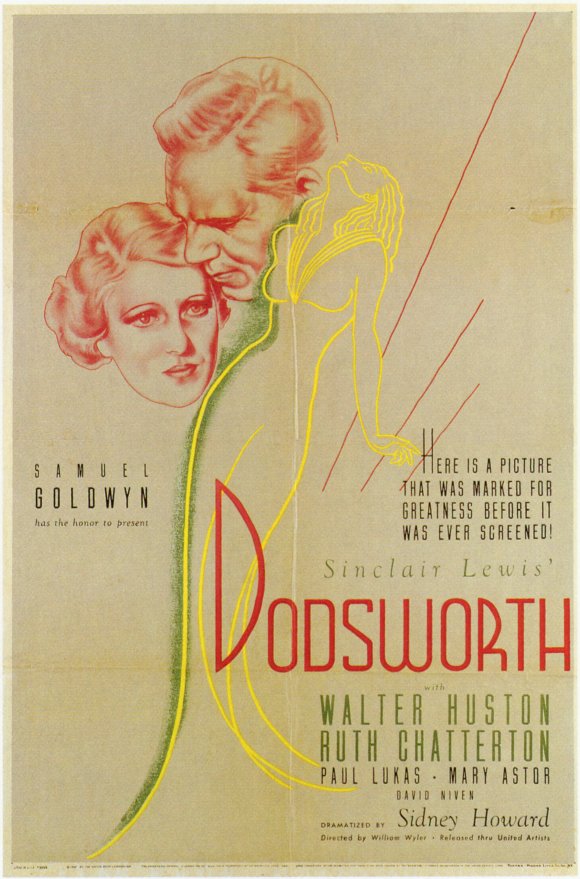 I’ve been doing things myself for a long time now, and I thought I’d give things a chance to do something to me.
I’ve been doing things myself for a long time now, and I thought I’d give things a chance to do something to me.
Dodsworth is a sensitive, superlative look at love, life and marriage.
It’s also a neglected classic about an American abroad.
After decades managing his automobile empire Samuel Dodsworth (Walter Huston) retires, setting sail for Europe with his wife Fran (Ruth Chatterton) on the grand tour they have always dreamt of. Abroad for the first time, Sam is agog at each new sight (and site) he encounters. Sadly his enthusiasm quickly clashes with Fran’s haughty affectations. Swept up by what she imagines to be the ‘smart set’, it’s not long before Fran grows disdainful of Sam’s modest, decidedly middle-class tastes and their sleepy Midwestern home. She also soon finds time to flirt with a series of younger men; Sam tolerantly attributes this to a fear of growing old. However when Fran refuses to return home and her affairs grow more desperate, the couple drifts apart. Dodsworth is caught between salvaging his marriage and the chance of new happiness with expatriate Edith Cortright (Mary Astor).
This certainly isn’t the film I thought I would cover next- in fact there are reams of diligently scribbled notes on half a dozen other movies to back me up. It’s just that Dodsworth is so thoughtful and thought-provoking it demands to be written about. Now, Voyager and Foreign Correspondent will just have to wait.
The post’s title refers to a scene early in the film: Sam strikes up a conversation with a seasoned traveller and she duly christens his tour the ‘education of an American’, a self-appointed six-month programme to broaden his mind and enrich his soul. It’s a prescient observation, since Sam’s goal is ‘to learn to enjoy his leisure’ by embracing new experiences and he and Fran learn so much more besides. Not least some uncomfortable truths about themselves.
It is no exaggeration to say that Walter Huston’s performance guides this film. He appears in almost every scene and invests Dodsworth with a quiet dignity and decency that warms your heart. Sam is a simple, straight-forward man who comes to the abrupt realization that there are no certainties in life: not his job, not his home and certainly not his marriage. What happens when your children are grown and do not seem to need you? How do you keep busy when there is nothing to do? And what do you do when you love someone, but they no longer love you?
Opposite such long-suffering sincerity, Fran Dodsworth might easily have devolved into a flat, self-absorbed caricature. Fortunately Ruth Chatterton and the script have other ideas. Fran is afraid of growing old before she has ever truly lived. Home isn’t cosy and secure: it’s a stale routine of ladies’ luncheons, dinners and bridge with the same old people, the same dull conversation. The trip to Europe is her chance to escape and reinvent herself as the sophisticated woman of the world she always wanted to be. Like Fanny in Mr. Skeffington– another restless but less sympathetic wife- Fran’s sense of self-worth also relies excessively on other people. She cannot believe herself desirable unless she is desired by other, younger, men. It is a testament to the maturity of this film that we glimpse things from Fran’s flawed perspective. You may not agree with her behaviour, but you do understand it.
All of this and I have barely written a word about Mary Astor. Suffice it to say that her performance here is as far from Brigid O’Shaughnessy in The Maltese Falcon as it is possible to be, and equally superb.
David Niven also appears as a cad who shows Fran just how much out of her depth she is.
Dodsworth is a grownup story for grownup people: beautifully acted and at times painfully sincere. It ultimately asks if it is ever too late to start life anew. Admirably, the answer is no.
Leave a Reply